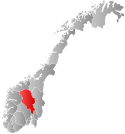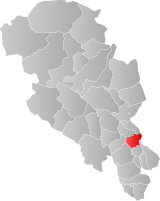Vardal is a former municipality in the old Oppland county, Norway. The 263-square-kilometre (102 sq mi) municipality existed from 1838 until its dissolution in 1964. The area is now divided between Gjøvik Municipality and Vestre Toten Municipality in the traditional district of Vestoppland. The administrative centre was the village of Vardal.[3]
Vardal Municipality
Vardal herred | |
|---|---|
 Old farmhouse in Vardal | |
 Oppland within Norway | |
 Vardal within Oppland | |
| Coordinates: 60°48′58″N 10°31′28″E / 60.8162°N 10.52443°E | |
| Country | Norway |
| County | Oppland |
| District | Vestoppland |
| Established | 1 Jan 1838 |
| • Created as | Formannskapsdistrikt |
| Disestablished | 1 Jan 1964 |
| • Succeeded by | Vestre Toten and Gjøvik municipalities |
| Administrative centre | Vardal |
| Area (upon dissolution) | |
• Total | 263 km2 (102 sq mi) |
| Population (1964) | |
• Total | 9,679 |
| • Density | 37/km2 (95/sq mi) |
| Demonyms | Vardøl Vardøling[1] |
| Time zone | UTC+01:00 (CET) |
| • Summer (DST) | UTC+02:00 (CEST) |
| ISO 3166 code | NO-0527[2] |
History
editThe prestegjeld of Vardal was established as a municipality on 1 January 1838 (see formannskapsdistrikt law). According to the 1835 census the parish had a population of 2,921 shortly before it became a municipality.[4] On 1 January 1861 the town of Gjøvik (population: 626) was separated from Vardal to constitute a separate municipality, leaving Vardal with a population of 4,114. On 1 January 1896, a small area of Østre Toten Municipality (population: 49) was transferred into Vardal. On 1 January 1900, an unpopulated area of Søndre Land Municipality was transferred to Vardal.[5]
During the 20th century, the town of Gjøvik was growing and twice the town annexed parts of Vardal. On 1 July 1921, an area with 723 residents was taken from Vardal and added to Gjøvik. Then again on 1 July 1955, another area (population: 1,372) was transferred from Vardal to Gjøvik. During the 1960s, there were many municipal mergers across Norway due to the work of the Schei Committee. On 1 January 1964, Vardal Municipality was dissolved and its lands and people were transferred to neighboring municipalities:[5]
- the Sørligrenda area (population: 87) was merged with Vestre Toten Municipality (population: 9,113), Eina Municipality (population: 1,591), and a small part of Gran Municipality (population: 12) to form a new Vestre Toten Municipality.
- the rest of Vardal (population: 9,612) was merged with the town of Gjøvik (population: 8,251), Snertingdal Municipality (population: 2,471), and Biri Municipality (population: 3,274) to form a new Gjøvik Municipality.
Name
editThe municipality is named after the Vardal valley (Old Norse: Vardalr) since the valley was located in the municipality. The first element is probably from the old name for a local river. the river name comes from the word ver which means "quiet" or "calm". The last element is dalr which means "valley" or "dale".[6][3]
Government
editWhile it existed, this municipality was responsible for primary education (through 10th grade), outpatient health services, senior citizen services, unemployment, social services, zoning, economic development, and municipal roads. During its existence, this municipality was governed by a municipal council of directly elected representatives. The mayor was indirectly elected by a vote of the municipal council.[7]
Municipal council
editThe municipal council (Herredsstyre) of Vardal was made up of 29 representatives that were elected to four year terms. The party breakdown of the final municipal council was as follows:
| Party name (in Norwegian) | Number of representatives | |
|---|---|---|
| Labour Party (Arbeiderpartiet) | 17 | |
| Communist Party (Kommunistiske Parti) | 3 | |
| Christian Democratic Party (Kristelig Folkeparti) | 1 | |
| Joint List(s) of Non-Socialist Parties (Borgerlige Felleslister) | 7 | |
| Local List(s) (Lokale lister) | 1 | |
| Total number of members: | 29 | |
| Party name (in Norwegian) | Number of representatives | |
|---|---|---|
| Labour Party (Arbeiderpartiet) | 18 | |
| Conservative Party (Høyre) | 2 | |
| Communist Party (Kommunistiske Parti) | 3 | |
| Christian Democratic Party (Kristelig Folkeparti) | 1 | |
| Farmers' Party (Bondepartiet) | 3 | |
| Liberal Party (Venstre) | 2 | |
| Total number of members: | 29 | |
| Party name (in Norwegian) | Number of representatives | |
|---|---|---|
| Labour Party (Arbeiderpartiet) | 12 | |
| Conservative Party (Høyre) | 1 | |
| Communist Party (Kommunistiske Parti) | 2 | |
| Christian Democratic Party (Kristelig Folkeparti) | 1 | |
| Farmers' Party (Bondepartiet) | 2 | |
| Liberal Party (Venstre) | 2 | |
| Total number of members: | 20 | |
| Party name (in Norwegian) | Number of representatives | |
|---|---|---|
| Labour Party (Arbeiderpartiet) | 11 | |
| Communist Party (Kommunistiske Parti) | 3 | |
| Christian Democratic Party (Kristelig Folkeparti) | 1 | |
| Farmers' Party (Bondepartiet) | 2 | |
| Joint list of the Liberal Party (Venstre) and the Radical People's Party (Radikale Folkepartiet) | 3 | |
| Total number of members: | 20 | |
| Party name (in Norwegian) | Number of representatives | |
|---|---|---|
| Labour Party (Arbeiderpartiet) | 11 | |
| Communist Party (Kommunistiske Parti) | 3 | |
| Farmers' Party (Bondepartiet) | 2 | |
| Joint list of the Liberal Party (Venstre) and the Radical People's Party (Radikale Folkepartiet) | 4 | |
| Total number of members: | 20 | |
| Party name (in Norwegian) | Number of representatives | |
|---|---|---|
| Labour Party (Arbeiderpartiet) | 16 | |
| Farmers' Party (Bondepartiet) | 4 | |
| Total number of members: | 20 | |
| Note: Due to the German occupation of Norway during World War II, no elections were held for new municipal councils until after the war ended in 1945. | ||
Mayors
edit- 1837-1839: Hans Skikkelstad
- 1840-1845: Hans Peter Borchgrevink
- 1845-1847: Henrik Christian Borchgrevink
- 1848-1849: Christian Braastad
- 1850-1865: Johan Braastad
- 1866-1869: Peder Mustad
- 1870-1881: Anders Jørgensen Veum
- 1882-1889: Nicolai Forseth
- 1890-1891: Peter Braastad
- 1892-1895: Andreas Kastad
- 1896-1898: Lars J. Aalstad
- 1899-1901: Andreas Kastad
- 1902-1910: Halvor Fosmark (AD)
- 1910-1922: Arne Fosnes (AD)
- 1922-1925: Kristian Nyjordet (Bp)
- 1926-1928: Ludvig Skjerven (RF)
- 1929-1937: Knut A. Jenseth (Ap)
- 1938-1940: Johannes Odnessveen (Ap)
- 1941-1943: Knut A. Jenseth (NS)
- 1943-1945: Kristian Fjeld (NS)
- 1945-1945: Johannes Odnessveen (Ap)
- 1946-1959: Andreas Nordland (Ap)
- 1959-1959: Harald Børresen (Ap)
- 1960-1963: Alf R. Iversen (Ap)
See also
editReferences
edit- ^ "Navn på steder og personer: Innbyggjarnamn" (in Norwegian). Språkrådet.
- ^ Bolstad, Erik; Thorsnæs, Geir, eds. (26 January 2023). "Kommunenummer". Store norske leksikon (in Norwegian). Kunnskapsforlaget.
- ^ a b Mæhlum, Lars, ed. (8 February 2022). "Vardal". Store norske leksikon (in Norwegian). Kunnskapsforlaget. Retrieved 14 October 2022.
- ^ Registreringssentral for historiske data. "Hjemmehørende folkemengde Oppland 1801-1960" (in Norwegian). University of Tromsø.
- ^ a b Jukvam, Dag (1999). Historisk oversikt over endringer i kommune- og fylkesinndelingen (PDF) (in Norwegian). Statistisk sentralbyrå. ISBN 9788253746845.
- ^ Rygh, Oluf (1900). Norske gaardnavne: Kristians amt (in Norwegian) (4 ed.). Kristiania, Norge: W. C. Fabritius & sønners bogtrikkeri. p. 28.
- ^ Hansen, Tore; Vabo, Signy Irene, eds. (20 September 2022). "kommunestyre". Store norske leksikon (in Norwegian). Kunnskapsforlaget. Retrieved 1 January 2023.
- ^ "Kommunevalgene og Ordførervalgene 1959" (PDF) (in Norwegian). Oslo, Norge: Statistisk sentralbyrå. 1960.
- ^ "Kommunevalgene og Ordførervalgene 1955" (PDF) (in Norwegian). Oslo, Norge: Statistisk sentralbyrå. 1957.
- ^ "Kommunevalgene og Ordførervalgene 1951" (PDF) (in Norwegian). Oslo: Statistisk sentralbyrå. 1952.
- ^ "Kommunevalgene og Ordførervalgene 1947" (PDF) (in Norwegian). Oslo: Statistisk sentralbyrå. 1948.
- ^ "Kommunevalgene og Ordførervalgene 1945" (PDF) (in Norwegian). Oslo: Statistisk sentralbyrå. 1947.
- ^ "Kommunevalgene og Ordførervalgene 1937" (PDF) (in Norwegian). Oslo: Statistisk sentralbyrå. 1938.
- ^ Lauvdal, Torgeir (1930). Vardal bygdebok (in Norwegian). Vol. 3. Gjøvik. pp. 232–242.
{{cite book}}: CS1 maint: location missing publisher (link)